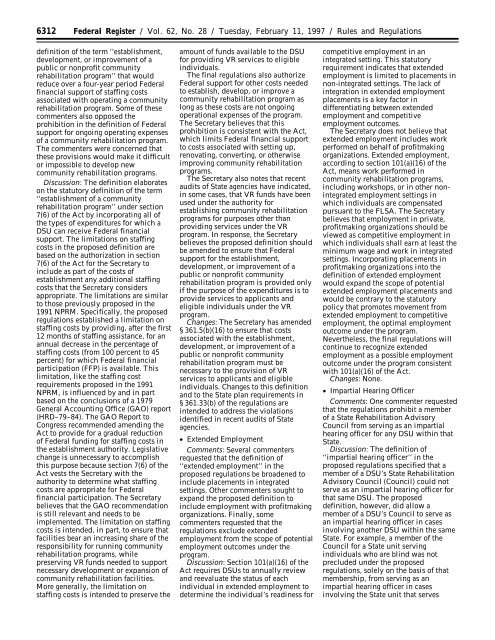federal register - U.S. Government Printing Office
federal register - U.S. Government Printing Office
federal register - U.S. Government Printing Office
Create successful ePaper yourself
Turn your PDF publications into a flip-book with our unique Google optimized e-Paper software.
6312 Federal Register / Vol. 62, No. 28 / Tuesday, February 11, 1997 / Rules and Regulationsdefinition of the term ‘‘establishment,development, or improvement of apublic or nonprofit communityrehabilitation program’’ that wouldreduce over a four-year period Federalfinancial support of staffing costsassociated with operating a communityrehabilitation program. Some of thesecommenters also opposed theprohibition in the definition of Federalsupport for ongoing operating expensesof a community rehabilitation program.The commenters were concerned thatthese provisions would make it difficultor impossible to develop newcommunity rehabilitation programs.Discussion: The definition elaborateson the statutory definition of the term‘‘establishment of a communityrehabilitation program’’ under section7(6) of the Act by incorporating all ofthe types of expenditures for which aDSU can receive Federal financialsupport. The limitations on staffingcosts in the proposed definition arebased on the authorization in section7(6) of the Act for the Secretary toinclude as part of the costs ofestablishment any additional staffingcosts that the Secretary considersappropriate. The limitations are similarto those previously proposed in the1991 NPRM. Specifically, the proposedregulations established a limitation onstaffing costs by providing, after the first12 months of staffing assistance, for anannual decrease in the percentage ofstaffing costs (from 100 percent to 45percent) for which Federal financialparticipation (FFP) is available. Thislimitation, like the staffing costrequirements proposed in the 1991NPRM, is influenced by and in partbased on the conclusions of a 1979General Accounting <strong>Office</strong> (GAO) report(HRD–79–84). The GAO Report toCongress recommended amending theAct to provide for a gradual reductionof Federal funding for staffing costs inthe establishment authority. Legislativechange is unnecessary to accomplishthis purpose because section 7(6) of theAct vests the Secretary with theauthority to determine what staffingcosts are appropriate for Federalfinancial participation. The Secretarybelieves that the GAO recommendationis still relevant and needs to beimplemented. The limitation on staffingcosts is intended, in part, to ensure thatfacilities bear an increasing share of theresponsibility for running communityrehabilitation programs, whilepreserving VR funds needed to supportnecessary development or expansion ofcommunity rehabilitation facilities.More generally, the limitation onstaffing costs is intended to preserve theamount of funds available to the DSUfor providing VR services to eligibleindividuals.The final regulations also authorizeFederal support for other costs neededto establish, develop, or improve acommunity rehabilitation program aslong as these costs are not ongoingoperational expenses of the program.The Secretary believes that thisprohibition is consistent with the Act,which limits Federal financial supportto costs associated with setting up,renovating, converting, or otherwiseimproving community rehabilitationprograms.The Secretary also notes that recentaudits of State agencies have indicated,in some cases, that VR funds have beenused under the authority forestablishing community rehabilitationprograms for purposes other thanproviding services under the VRprogram. In response, the Secretarybelieves the proposed definition shouldbe amended to ensure that Federalsupport for the establishment,development, or improvement of apublic or nonprofit communityrehabilitation program is provided onlyif the purpose of the expenditures is toprovide services to applicants andeligible individuals under the VRprogram.Changes: The Secretary has amended§ 361.5(b)(16) to ensure that costsassociated with the establishment,development, or improvement of apublic or nonprofit communityrehabilitation program must benecessary to the provision of VRservices to applicants and eligibleindividuals. Changes to this definitionand to the State plan requirements in§ 361.33(b) of the regulations areintended to address the violationsidentified in recent audits of Stateagencies.• Extended EmploymentComments: Several commentersrequested that the definition of‘‘extended employment’’ in theproposed regulations be broadened toinclude placements in integratedsettings. Other commenters sought toexpand the proposed definition toinclude employment with profitmakingorganizations. Finally, somecommenters requested that theregulations exclude extendedemployment from the scope of potentialemployment outcomes under theprogram.Discussion: Section 101(a)(16) of theAct requires DSUs to annually reviewand reevaluate the status of eachindividual in extended employment todetermine the individual’s readiness forcompetitive employment in anintegrated setting. This statutoryrequirement indicates that extendedemployment is limited to placements innon-integrated settings. The lack ofintegration in extended employmentplacements is a key factor indifferentiating between extendedemployment and competitiveemployment outcomes.The Secretary does not believe thatextended employment includes workperformed on behalf of profitmakingorganizations. Extended employment,according to section 101(a)(16) of theAct, means work performed incommunity rehabilitation programs,including workshops, or in other nonintegratedemployment settings inwhich individuals are compensatedpursuant to the FLSA. The Secretarybelieves that employment in private,profitmaking organizations should beviewed as competitive employment inwhich individuals shall earn at least theminimum wage and work in integratedsettings. Incorporating placements inprofitmaking organizations into thedefinition of extended employmentwould expand the scope of potentialextended employment placements andwould be contrary to the statutorypolicy that promotes movement fromextended employment to competitiveemployment, the optimal employmentoutcome under the program.Nevertheless, the final regulations willcontinue to recognize extendedemployment as a possible employmentoutcome under the program consistentwith 101(a)(16) of the Act.Changes: None.• Impartial Hearing <strong>Office</strong>rComments: One commenter requestedthat the regulations prohibit a memberof a State Rehabilitation AdvisoryCouncil from serving as an impartialhearing officer for any DSU within thatState.Discussion: The definition of‘‘impartial hearing officer’’ in theproposed regulations specified that amember of a DSU’s State RehabilitationAdvisory Council (Council) could notserve as an impartial hearing officer forthat same DSU. The proposeddefinition, however, did allow amember of a DSU’s Council to serve asan impartial hearing officer in casesinvolving another DSU within the sameState. For example, a member of theCouncil for a State unit servingindividuals who are blind was notprecluded under the proposedregulations, solely on the basis of thatmembership, from serving as animpartial hearing officer in casesinvolving the State unit that serves


